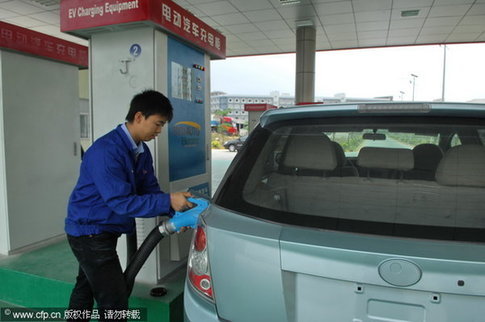More plug-in stations coming soon

State Grid Corp of China (SGCC), the nation's biggest electricity distributor, plans to construct 75 electric car recharging stations across 27 cities this year, as part of its plan to support fuel-efficient transportation, a company executive said yesterday.
The plan includes the construction of 6,209 recharging towers, according to the executive who requested anonymity. The specific number of recharging towers planned per station was not revealed.
"The plan, which is a pilot project, is part of our strategy to build a smart grid," he added, without elaborating.
A smart grid delivers electricity from suppliers to consumers using two-way digital technology to save energy, reduce costs, increase reliability and transparency.
Earlier media reports said China is planning a multi-billion yuan investment in smart-grid construction to increase the capacity of the nation's power grids.
SGCC, which manages power transmission and distribution in 26 provinces, autonomous regions and municipalities, completed its first electric car charging station in November. The station, covering 400 sq m, cost 5.08 million yuan, the company said on its website.
"It is certainly good news for us," said Wang Bin, president of Beijing Lithium Energy Investment Co, an electric-car producer. "The improvement in infrastructure will certainly boost the development of the whole industry."
Cars made by Beijing Lithium have already been put into use in the public transportation system in Tangshan, Hebei province, he said. The company has also worked with the local government to build several pilot recharging stations, he added.
The main challenge for industry planners is selecting a standard. "In my opinion we need to develop a national standard for recharging vehicles."
China's electric car industry has undergone accelerated development in recent years, with both domestic producers and foreign companies eyeing the sector.
Thomas Weber, a board member with German carmaker Daimler and responsible for Mercedes-Benz car development, said the company would enter China's electric car market as soon as charging stations become available.
"We have advanced technologies and reliable products in the electric car segment. Once China has settled the charging issue we will consider introducing our electric cars to the China market," he said. He also told China Daily that Daimler is seeking to cooperate with domestic industry players in the development of electric car parts.
Over the next decade, between 5 and 10 percent of the German carmaker's new offerings will be alternative-energy vehicles.
Go to Forum >>0 Comments
 Add your comments...
Add your comments...
- User Name Required
- Your Comment
- Racist, abusive and off-topic comments may be removed by the moderator.
 0
0 






